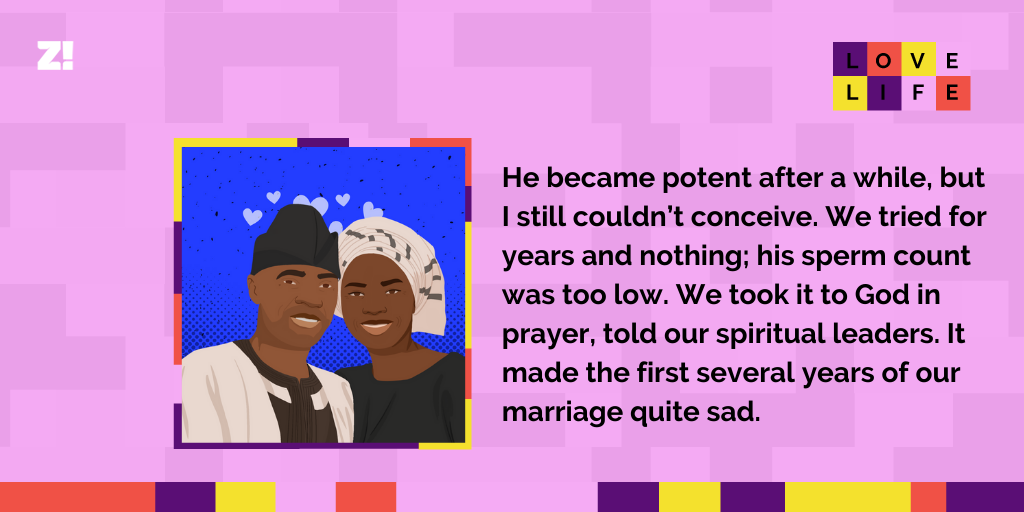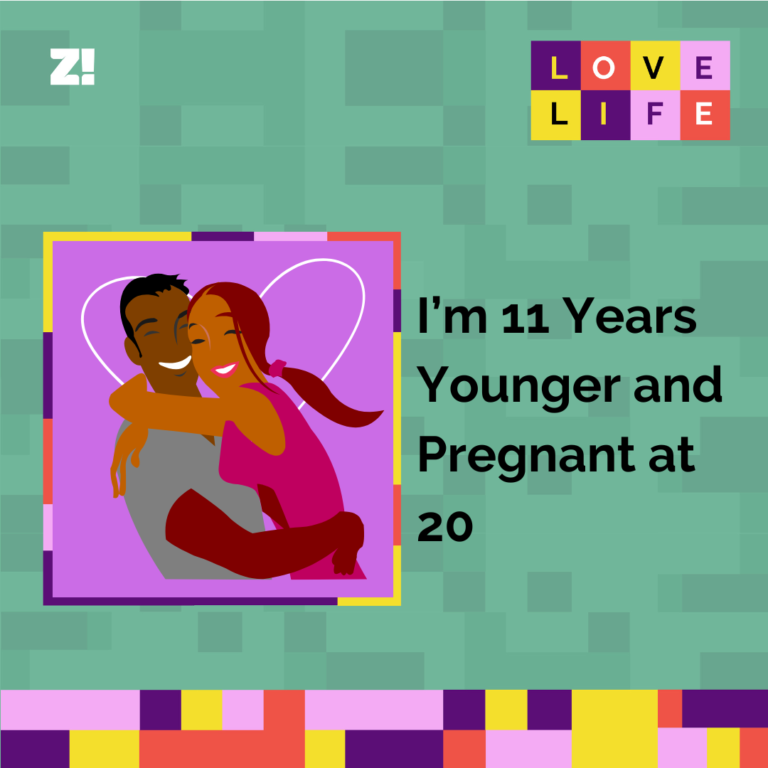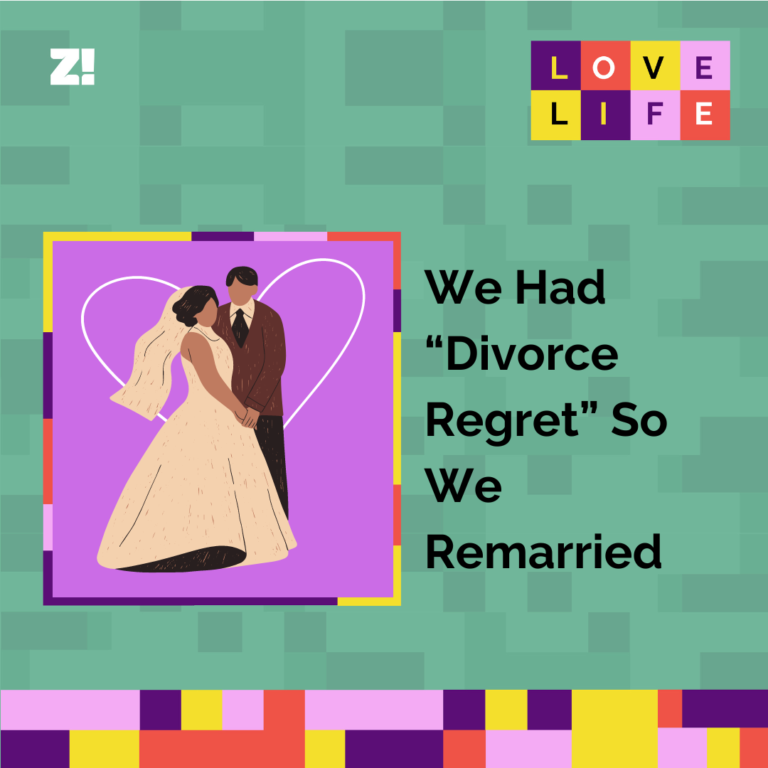Love Life is a Zikoko weekly series about love, relationships, situationships, entanglements and everything in between.

What’s your earliest memory of each other?
Kola: We met during a church outreach in Kaduna in 1987. She served there when I was transferred to Kaduna town with other church members for missionary work. She met some church representatives who went to preach to corpers while she was in camp, so when she got out, she started attending our local fellowship with her friends.
The first day I saw her, we got along very well, and I invited her and her friends over to the missionary lodge for lunch. We ended up having a mini bible study and talking about life. At first, I liked one of her friends and thought about courting her, but by the end of the day, I preferred Wunmi. I liked her gentle temperament.
Wunmi: I first saw him when he preached about God’s love during one fellowship. He was so passionate about his message that he made me want to experience that kind of love more.
After he invited us to the lodge and we talked, I had a feeling we’d get married. Back then, the process of dating was a lot simpler. You find someone you gel with, and if they gel with you too, it’s smooth sailing from there to marriage except there are complications like tribalism, religion or genotype. We already knew we were well-matched in the first two, and by the next meeting, we’d confirmed we were both AA.
So did you immediately decide on marriage?
Kola: No. We courted first.
I introduced her to my mentor in Kaduna then and also telephoned my spiritual father back in Oyo about her. All that happened in the first month. She didn’t tell any of her folks about me because we decided she’d have to finish NYSC first before we moved things forward. But I wanted to set things right spiritually.
Wunmi: I was also watching him to be sure he was kind and I liked spending time with him. He helped me get a room at the lodge, so I spent the service year working for the government, helping out at the fellowship and spending time with him and other church leaders. I never had to worry about food or transportation. It was such a peaceful, lovely time.
Then he got called back to his home church in Ibadan about two months before my passing out. But he promised to come to Lagos and marry me once I was back there. We exchanged contact addresses, and he left. I cried for days because I missed his constant presence. That’s how I knew I wanted to spend the rest of my life with him.
I’m guessing he came to Lagos as promised?
Wunmi: He did.
First, he called the house some weeks after I’d settled in. This was in May 1988. My older brother picked up the phone and called me to answer it. I was so happy to hear his voice after so long. He came to see my father sometime in June, and something funny happened. My father didn’t like him.
Kola: We never got along until the day he died.
Wunmi: He told me, “This man is sickly. Is this really who you want to marry?”
Kola has always been lanky. In fact, that was one of the things that attracted me to him when we were in Kaduna, his tall, lean frame. My dad asked me to find out what was wrong with him because he was sure something was wrong. I felt bad because it’s not like he looked sick, he was just lanky.
I went ahead and asked him. He told me nothing was wrong. My father later gave his consent for us to marry after some long investigations from both families.
What kind of investigations?
Kola: My family sent some trusted people to find out about her family and hometown. It was very common in our time for people to go to your village and get to the root of your upbringing and family line even before the normal family introduction.
Her family did the same until both sides were satisfied.
Wunmi: My father even sent our firstborn to his workplace in UTC Foods to make sure he really worked there. We passed all the tests, and our families finally met in Lagos. The traditional and wedding proper happened in my hometown in Sagamu in April 1989.
Everything happened smoothly, and we moved to Ibadan together.
How was it like being newlyweds?
Wunmi: It was scary and I was homesick. I’d never lived in Ibadan before then. I was also a bit of a Mama’s girl. Even though I schooled in Ife, I used to go home for every single holiday. In fact, my NYSC year was the only time I’d lived away from home for a stretch.
But the real stress all started when we were ready to consummate the marriage some weeks after the wedding and he couldn’t make it work.
Kola: I thought it was just anxiety. When this persisted for about a month, we went to the clinic and discovered I had high blood sugar. They had to refer me to University College Hospital. It took several tests before they diagnosed me with Type 2 diabetes.
Wunmi: It had been left untreated in his system for too long. The first thing that came to my mind was that my father was right. Should I have listened to him and not married Kola? We were crushed, but the doctor assured us that all would be well after a few months of proper treatment.
Was he right?
Wunmi: He became potent after a while, but I still couldn’t conceive. We tried for years and nothing; his sperm count was too low. We took it to God in prayer and told our spiritual leaders. It made the first several years of our marriage quite sad.
Kola: As if getting the diagnosis reminded my body that something was wrong, I started getting weak all the time. The medications managed the weakness and sugar deficiency but made me feel horrible. Managing my health with work and the constant stress about making a family was a great trial for us.
Wunmi: I got a job at a school two years into marriage, and it helped distract me a bit. But all we did was try everything we could afford to try to help me conceive.
I’m not sure there was anything like IVF then. Surrogacy could only happen if I wanted another man’s sperm inserted into my womb. Somehow, the thought of that only made our situation feel worse.
How did this affect your daily relationship with each other?
Kola: At first, we stayed positive. But by the third year, around the time when she got her job, we started to fight a lot. We were constantly arguing, and I could tell I was making her miserable.
Wunmi: I think I was just hurt and confused.
Kola: Things mellowed by the fourth year. Maybe she resigned herself to the situation, but she became more willing to be happy in the marriage. We could have normal conversations again, and I noticed she never brought up having a baby, so I followed suit.
Wunmi: After our fifth year of marriage, in ‘94, my mum visited. She’d visited a couple of times before then, but this time, she came with a purpose. It was written all over her when she walked through our door. In private, she asked me what was going on that we hadn’t conceived.
She was the kind of sweet mother who would’ve never pressured me to give her grandchildren, but even she had reached her limit. I had to confide in her about Kola’s health condition.
What was her reaction?
Wunmi: She was so sad at first. But then she said, “It’s not the end of the world. We’ll just remain prayerful.” I burst into tears in her chest.
I’d never really thought about having children as this amazing thing I wanted at all costs, but it was something that one just expects to do with ease. I didn’t know how to get past not being able to be a mother. But after that, I resolved that I’d accept my fate.
Kola: She became more withdrawn after that particular visit from her mother. But I didn’t know why until we spoke about it years later. It affected our spiritual life too. The stress made us withdraw from active evangelism and missionary work.
Wunmi: There was a brief moment when I lost faith, not quite in God but in the religious activities and constant prayer. Between ‘93 and ‘95, I wasn’t prayerful at all. I was exhausted from playing Hannah earlier on in our marriage. I just wanted to attend normal Sunday service, take what I could from the sermon and go.
What about your sex life?
Kola: The last time we had sex regularly was most likely in ‘95 or ‘96.
If you want to share your own Love Life story, fill out this form.
Were you ever able to get past this dark part of your marriage?
Kola: Our tenth year was the turning point for us, I think.
We moved to Lagos in 1999, away from the relatives and acquaintances who constantly badgered her about when we planned to start having children.
Wunmi: He got a new job in Lagos, and moving back to a state I knew well was surprisingly healing. We focused more on being good friends and partners and planning out the rest of our lives. That’s also when we first considered adopting. Although we didn’t take it seriously until well into 2001.
Kola: Some years before then, one of my cousins brought up plans for him and his wife to adopt, and my family had frowned on it seriously. My late father was very vocal in his disapproval. They made it impossible for the cousin to go through with it because of how often they brought it up and made it seem like he was evil for even considering it.
So I knew if we had to do it, no one could know the children were adopted.
How did you pull that off?
Kola: First, I had to also convince Wunmi to want to keep it secret. Then we had to go through Nigeria’s stringent adoption process for a newborn.
Wunmi: This also affected our relationship because I was uncomfortable with the dishonesty. I didn’t think it would work. It also meant I’d have to spend months with his sister in America to “give birth”.
But I decided to accept. I was just tired of the whole thing.
Tell me how it went
Kola: We started the adoption process in August 2001 and completed it in February 2003, so the newborn we’d initially selected had to be replaced with another baby. We never met the parents; we only saw photos.
Wunmi: This scared me because wouldn’t they want to meet the people who’d take over as parents to their baby? It made me wonder what kind of genetics our new baby would have. But then, I put myself in their shoes and realised maybe it’d be too painful for them to meet us and still hand their baby over.
I was also scared they’d grow up and want to know their biological parents.
Kola: Completing the adoption process meant that they got new birth certificates with our names on them as their parents, so I didn’t worry too much about it. But there was a long back and forth working with the officials, getting the social welfare officers to visit our home and submit positive recommendations to the court and so on. Halfway through, I just wanted to give up.
Wunmi: Meanwhile, I felt so ashamed lying to my mum, of all people, about everything. And when she passed away in 2002, I was inconsolable. I know I would’ve told her about it in the end. I never would’ve gone through with it without telling her.
I’m so sorry. What exactly did you do to successfully keep the whole plan a secret from family and friends?
Kola: We’d rather not discuss that here.
Wunmi: But it’s no longer a secret. Shortly after we adopted our second baby in 2006, we told everyone about it and how the first was also adopted. It was just time; we’d matured a lot, and it was less easy to go through with the elaborate charade a second time.
Kola: We were ostracised in many ways, but in the end, we were fine. At least, the children have grown up knowing the truth, so it doesn’t crush their identity in adulthood.
True. In what ways were you ostracised?
Kola: My father disowned me for about two years until I had to make a show of seeking out his forgiveness with several visits, tears and prostrations. My mother refused to come and help Wunmi out after we just brought home our second child.
Wunmi: She said something like, “You didn’t push her out, so you’re strong enough to handle taking care of her na.” We managed to get by without much family support.
Kola: Her father already didn’t like me, so he felt quite justified by everything that was happening.
Wunmi: Maybe because of this, our second baby drew us closer. She was a gentle and easygoing baby. We found it easy to work together to take care of her and the household during this period.
Did things get easier after this?
Wunmi: Yes. After the children came into our lives, it felt like we could finally settle and move forward. I started a catering business and became more active in church because I wanted to raise them to be godly.
Kola: She still worries about them asking about their real parents, but so far, that’s never happened.
What would you do if they asked?
Kola: We’ll point them in the right direction and leave the rest to God.
Wunmi: That might be easier said than done for me.
On a scale of 1 to 10, how would you rate your Love Life?
Wunmi: I’d rate it a 7 because it could’ve been a lot worse, but we’ve been able to approach our battles with kindness, gentleness and the grace of God.
Kola: She has said it all. 7.
Check back every Thursday by 9 AM for new Love Life stories here. The stories will also be a part of the Ships newsletter, so sign up here.
This was exciting: Love Life: We Went From an Open Relationship to Polyamory




